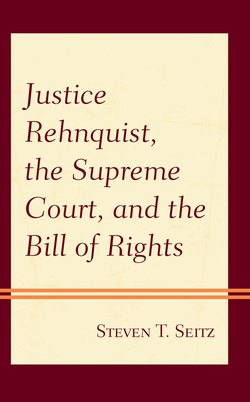Читать книгу Justice Rehnquist, the Supreme Court, and the Bill of Rights - Steven T. Seitz - Страница 30
На сайте Литреса книга снята с продажи.
To Sue
ОглавлениеTaney tried to distinguish a right to sue based on status as free or slave and a right to sue based on being a national citizen. Scott was suing for his freedom; Darnell had to establish his status as a free man. Taney substituted his purposes rather than Scott’s actual suit. Taney then stooped to a red herring, suggesting that the Darnell case illustrated the evils of states conferring national citizenship, which had little correspondence to the Legrand suit and Darnell countersuit. Taney again asserted that the Constitutional power to determine national citizenship is the nation, not the state. Taney insisted that he constructed the Constitution as the Founding Fathers intended (originalism?), and if slaves or their descendants want national citizenship, a Constitutional amendment would be in order. Popular opinion or passion of the day cannot determine the construction of the Constitution.
The Taney presentation bordered on harangue. His decision line, for example, held an oddity. Taney had perseverated over national citizenship for several pages. His decision line stated that Scott cannot be a citizen of Missouri and hence is not entitled to sue in its courts. The federal circuit court had no jurisdiction because Scott is of a class denied national citizenship. Is Taney arguing that national citizenship determines state citizenship? If not, why is SCOTUS deciding a state law, especially when the state courts and federal circuit court made no such determination? The oddity here is that Taney used a set of arguments about the Constitutional meaning of citizenship. He has admitted that states may have given state citizenship to slaves or their descendants. He has clearly separated state and national citizenship. So how do we go from an exegesis on national citizenship to denial of state citizenship? Whether Missouri law considered a slave or their descendants free is a different matter determined by state law.
Various owners took Scott and family into states and territories where slavery is illegal. Scott claimed freedom, and the Missouri municipal court agreed. This was the subject of the suit and was quite independent of his status as a resident of Missouri. Taney made the argument that, if removal into free territories did not give him freedom, then he is still a slave. Taney argued that a slave must be either a citizen of a state or the nation or both, but Scott was not a citizen of Missouri and could not be a national citizen. Taney then insisted that the circuit court should dismiss the case because Scott was a slave. He then wanted to pursue other questions, including the circuit court abatement agreement, even though that was not in the writ of error. Taney rejected the claim that his ruminations from this point were merely dicta. He argued that SCOTUS had the right to reverse the lower court for any error on the record, even though he has just decided the court had no jurisdiction. Taney wanted to draw a distinction between whether SCOTUS had no jurisdiction, or the circuit court had no jurisdiction. If the former, the record examination is at an end; if the latter, SCOTUS is free to examine the entire record for other errors even if the circuit court sent the writ of error on a single point. The act of sending the writ was enough for expansive SCOTUS jurisdiction. Large controversies gave SCOTUS jurisdiction and the right and duty to examine the whole case. Taney concluded his assertion of review that if he found an error, SCOTUS would reverse and remand the case to the court that he had just decided had no jurisdiction. Ignoring SCOTUS procedures emphasizing the narrowest possible decision, Taney set the stage for a massive foray over legislation on slavery by arguing that the judgment below erroneously favoring one party was as grave an error as a court can commit, even though he was about to make law favoring the other party and then sought error made by a court lacking jurisdiction and a writ of error on an entirely different issue.
